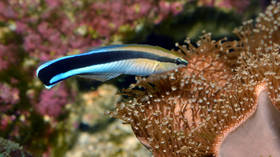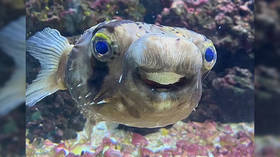Fish might be self-aware – study

A new study has suggested that fish might be self-aware and able to recognize themselves in mirrors, in a similar way to humans and apes. Researchers at the Graduate School of Science in Osaka City University conducted the work across a number of years, exploring the capability of fish to achieve mirror self-recognition.
The experiment worked by administering an anesthetic to the fish, placing an artificial brown mark on its body that resembles a parasite, and providing a mirror to see if the animal tries to touch or remove the spot.
The scientists chose the cleaner wrasse fish for the study, as it “will pay attention to small parasites.” When presented with the mirror, the marked fish would scrape their throats against the tank substrate in an attempt to remove the brown pigment.
After the first study in 2019 generated some controversy over claims it had used a small sample size and the marking technique employed could have physically irritated the fish, causing their self-scraping responses.
The newly released study seeks to counter that criticism, with a larger sample size and a new injection technique, at a lower depth of one millimeter rather than the previously more invasive injection of three millimeters.
In the new test, fish with the shallow mark only scraped their throats in an attempt to remove the brown pigment when a mirror was present, suggesting the visual cue of seeing the brown spot on themselves had sparked the reaction, rather than physical irritation.
“With these new experiments the evidence for [mirror self-recognition] is about as strong as it can get,” primatologist Frans de Waal, who criticized the initial study, stated.
Highlighting the likelihood that fish do experience self-awareness, de Waal argued that it would be an “unreasonable assumption” to believe only humans and apes are capable of this cognitive ability, adding: “Why would awareness be the only cognitive trait in the animal world that appeared all of a sudden without any precedent and only in a tiny group of species?”
The team at Osaka City University are planning to follow up their second study with a third piece of research that explores the “more interesting question” of how the fish recognize themselves in the mirror and if they can identify themselves by their faces, as humans do.













